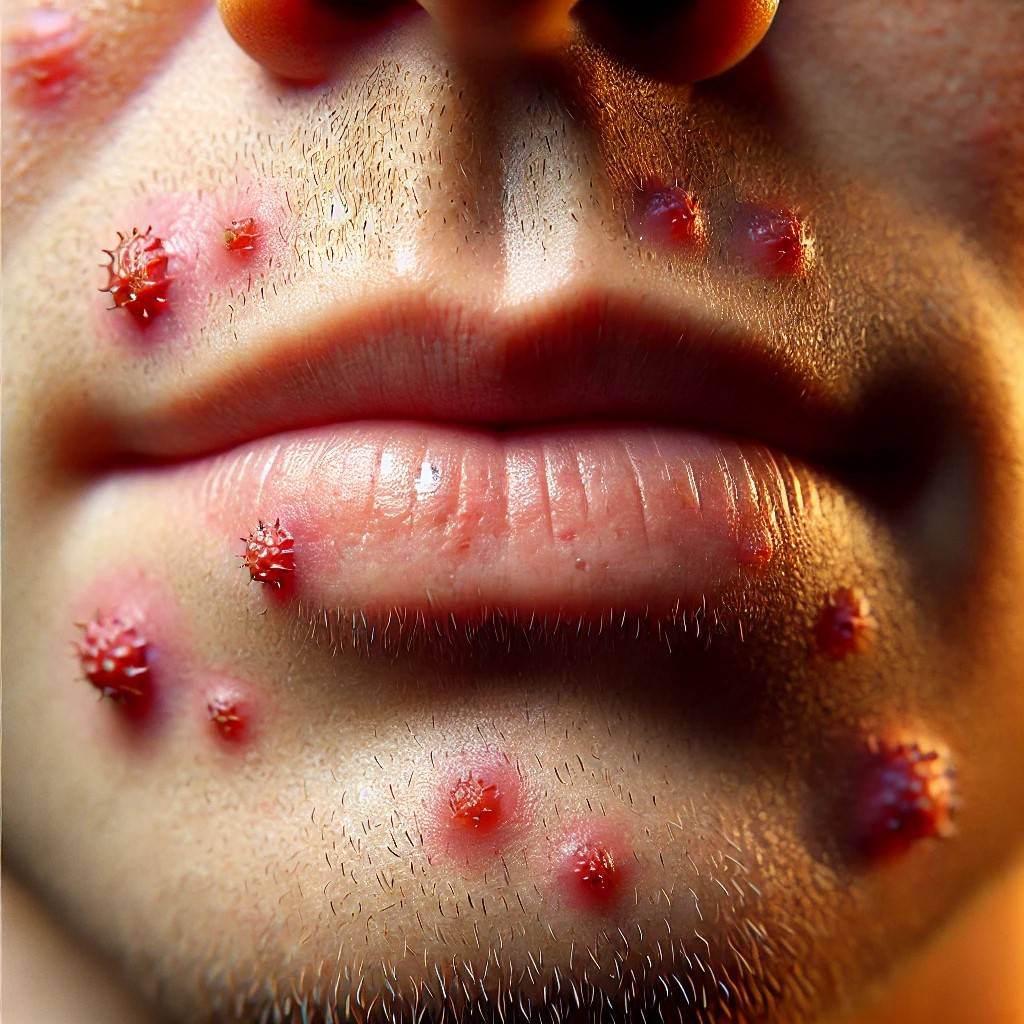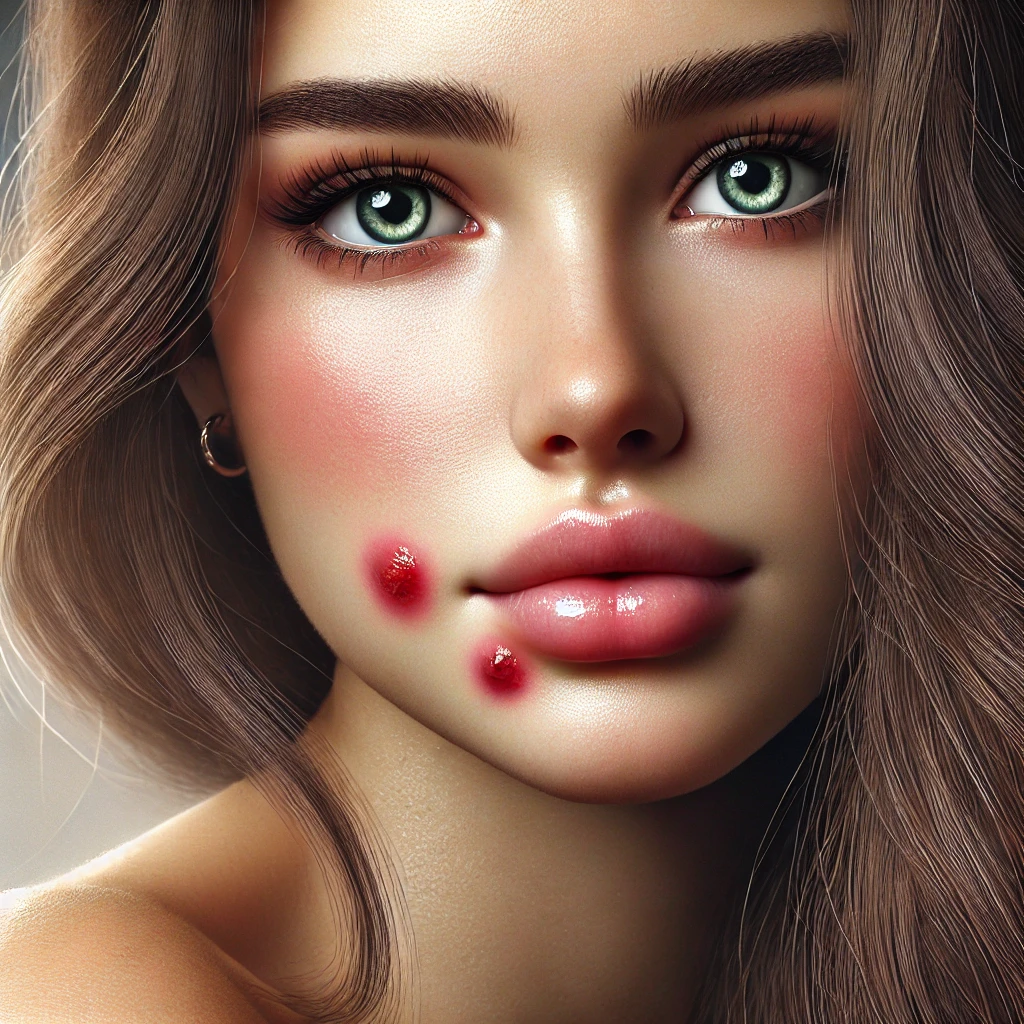Herpes on Lip: What It Is, Symptoms, and How to Treat It Fast
I’ve seen many people struggle with herpes on the lip, also known as cold sores. It’s one of those things that can seem embarrassing, but you don’t need to feel that way. Trust me, this happens to many people, and it’s manageable. I’ve tested several remedies myself, and I will walk you through the symptoms and treatments so you can handle them quickly and easily.
What Is Herpes on Lip?

Herpes on the lip is caused by the herpes simplex virus (HSV-1). It’s a viral infection that stays in your body once you have it. Sometimes, you may hear about HSV-2; this usually causes genital herpes, but in rare cases, it can also appear on the lips.
This virus causes small blisters on your lips or around your mouth. The blisters can be painful, and you might feel like they look awful. But the good news is that these blisters usually heal in a week or two. Even though the virus stays with you for life, it’s only active at certain times. [Here I want to emphasize that it’s not constantly visible, which can ease some readers’ worries.]
Symptoms of Herpes on Lip
The symptoms can vary from person to person. However, most people notice a tingling sensation before a cold sore appears. This is the first sign that an outbreak is coming.
Other common herpes symptoms include:
- Blisters on the lips: These are small and filled with fluid. They can appear anywhere around your mouth.
- Pain or burning feeling: The sores can hurt when you eat, drink, or even talk.
- Oozing and crusting: After a few days, the sores will burst, leaving a crust that heals over time.
Some people also feel tired or have a mild fever when they experience their first outbreak. This is usually not as bad during later outbreaks. [Telling people the worst symptoms often appear only in the first outbreak reassures them. They will know future outbreaks won’t be as intense.]
What Triggers Herpes on Lip?
Herpes don’t show up randomly. Certain things trigger an outbreak. I’ve noticed that stress and sun exposure are the biggest triggers. Here’s a list of common things that I think will cause the virus to reactivate:
- Stress: High stress can weaken your immune system and lead to an outbreak. I recommend trying relaxation techniques like meditation.
- Sun exposure: Too much sun can trigger a cold sore. Using lip balm for cold sores with SPF can help protect your lips.
- Illness: If you get sick, your body might not fight the virus as well, which can cause an outbreak.
- Hormonal changes: Women may notice more cold sores during their period.
- Fatigue: Being overly tired can trigger an outbreak.
Avoid these triggers for herpes as much as possible. [This section helps readers understand the common triggers, which will help them manage outbreaks better.]
How to Treat Herpes on Lip Fast

When you feel a herpes outbreak coming, it’s important to act fast. This way, you can reduce the symptoms and speed up healing. Here are some ways I’ve found to be most effective:
- Antiviral Medications
Antiviral medications like acyclovir or valacyclovir are your best bet if you want to treat cold sores quickly. These medications can reduce the time it takes for a cold sore to heal. They also help prevent the virus from spreading to others.
You can get these antiviral creams and pills from a doctor. They’re effective if you start taking them as soon as you feel that first tingling sensation.
- Over-the-Counter Treatments
I’ve personally tried several over-the-counter treatments, and some do work. Cold sore patches are one of my favourites because they cover the sore and help it heal faster. You can also try creams like docosanol (Abreva), which may shorten healing time if applied early.
These treatments are great for when you can’t get a prescription right away. But don’t wait too long—start using them at the first sign of a cold sore.
- Natural Remedies for Herpes
If you prefer natural methods, there are a few home remedies that I’ve seen work. Here are some that might help:
- Aloe vera: It’s soothing and has healing properties. I’ve used it myself, and it feels great on sore lips.
- Lemon balm: Some studies suggest it can reduce redness and swelling.
- Ice: Applying ice can reduce pain and swelling for a bit. Just make sure not to overdo it because it might dry out your lips.
These remedies won’t cure the virus, but they can help ease the pain and make the sores feel less uncomfortable. [Including natural remedies gives readers more options, which can be appealing to those hesitant about pharmaceuticals.]
- Lifestyle Changes
Changing small habits can also help reduce the number of recurring outbreaks you experience. Here are some tips I’ve found useful:
- Boost your immune system: Eat a balanced diet, drink plenty of water, and get enough sleep. A strong immune system can help keep the virus dormant.
- Manage stress: I like practicing mindfulness and doing yoga to stay relaxed. Reducing stress can prevent future outbreaks.
- Use sunscreen on your lips: Protect your lips from sun exposure by using a lip balm with SPF. This helps prevent an outbreak.
Making these small changes can go a long way in preventing cold sores from showing up too often. [This is important because readers are looking for long-term solutions, not just quick fixes.]
How to Prevent Spreading Herpes
Herpes is highly contagious, especially when you have visible blisters. It’s important to avoid spreading the virus to others. I’ve seen too many people accidentally pass it on because they didn’t know they were contagious. Here are some prevention tips:
- Avoid kissing or close contact during an outbreak.
- Don’t share utensils or drinks with others.
- Wash your hands after touching your face or the cold sore.
- Avoid touching your face too much, as this can spread the virus to other areas.
These simple steps can help you avoid spreading contagious herpes to others, which is important if you live with family or are around friends a lot. [This section helps readers understand how to protect their loved ones.]
How Long Does It Take for Cold Sores to Heal?
Cold sores usually heal in about 7 to 10 days. However, with the right treatment, you can reduce this healing time. I’ve noticed that using antiviral medications or starting treatment early can help speed up the process.
For most people, the sore will start to dry up after a few days and form a crust. This crust will eventually fall off, and your skin will heal.
If you’re using cold sore patches or antiviral creams, the healing time can be even shorter. The key is to start treatment as soon as you feel that first tingling sensation. [Readers want to know how long they’ll have to deal with this, so providing a clear timeline gives them some peace of mind.]
FAQs About Herpes on Lip
Here are some common questions people have about herpes on the lip:
How Do You Get Herpes on the Lip?
Herpes on the lip is spread through direct contact, like kissing or sharing utensils. The virus can be passed even when sores aren’t visible, so it’s important to always be cautious.
Is Herpes on the Lip Contagious?
Yes, it is very contagious, especially when you have visible sores. Avoid close contact with others during an outbreak.
Can You Get Rid of Herpes on the Lip Permanently?
Unfortunately, no. The virus stays in your body for life, but treatments can help manage symptoms and reduce the frequency of outbreaks.
What Triggers Cold Sores?
Common triggers include stress, sun exposure, fatigue, and illness. Identifying your triggers can help you prevent future outbreaks.
What Is the Best Herpes Treatment?
The best treatment is antiviral medications prescribed by a doctor. However, over-the-counter treatments and natural remedies can also help.
Final Thoughts
Herpes on the lip can be annoying, but it doesn’t have to take over your life. I’ve tested many treatments, and I’ve found that acting quickly when you feel a cold sore coming on is key. Whether you use antiviral medications, natural remedies, or just take better care of yourself, there are many ways to manage this condition.
By making minor lifestyle changes, like managing stress and using lip balm for cold sores with SPF, you can prevent future outbreaks and enjoy a life free from frequent cold sores. Stay informed, take care of yourself, and don’t let herpes on the lip hold you back!
Recommended Reading
Fever Blister on Lip: Causes, Symptoms, and Solutions



